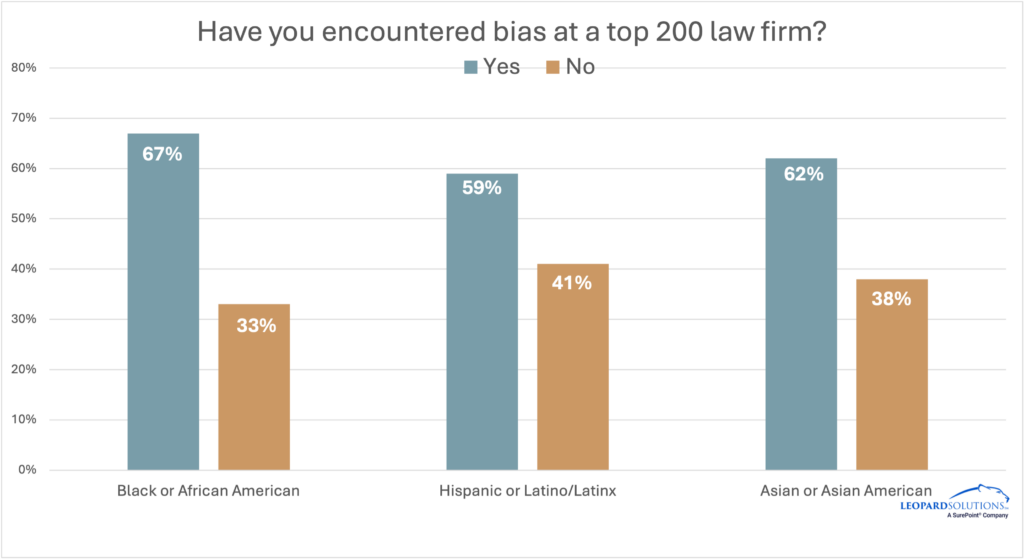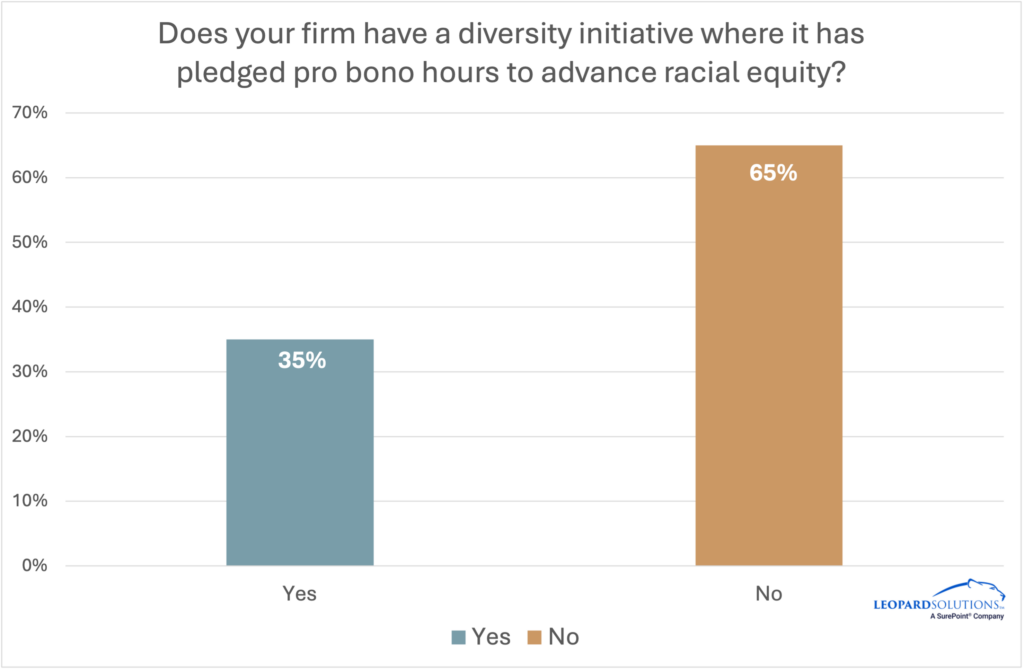The survey findings reinforced pervasive racial biases within Am Law 200 firms. While 62% of respondents encountered bias, the distribution varied across demographics. Women were notably more likely than men to experience bias, with rates at 66% compared to 58%. Among racial groups, Black or African Americans reported the highest level of bias (67%), followed by Asian or Asian Americans (62%), and Hispanic or Latino/LatinX (59%).

Participants elaborated on the types of biases they encountered, ranging from implicit bias to outright exclusion from coveted assignments. Instances of micro-aggressions were common, alongside more overt acts such as derogatory comments and stereotypes. Examples included Black partners being unfairly labeled as “not hard workers,” a senior partner making racially charged remarks, and discriminatory assumptions based on ethnicity or sexual orientation.
Types of Bias Encountered
The consequences for speaking out against disparities were dire for some, as illustrated by one whistleblower’s experience. After reporting offensive behavior by a partner, including racist and dismissive remarks, the whistleblowers found themselves marginalized and eventually left the firm. Shockingly, the partner in question was subsequently promoted, highlighting systemic issues within the firm’s culture and leadership.
“It will likely never be fixed, but if it is ever fixed, it would be because of an industrywide reckoning. In the interim, black folks will continue to suffer in silence because, in big law, the squeaky wheel doesn’t get the oil; it gets blackballed.”
Troubling behaviors were frequently directed towards women and women of color within the legal profession. One respondent described being subjected to derogatory comments, such as being likened to a “terrorist” or labeled as “angry” during political discussions. Another recounted being told that having a woman present would disrupt “boy locker talk” with clients. Gender imbalances were also evident, with junior female associates often expected to handle tasks like arranging food for client meetings. At the same time, their male counterparts were exempt from such duties.
Institutional Biases and Cultural Insensitivities
Some transgressions reflected institutional biases, such as firms neglecting to sponsor events during Black History Month but actively participating in St. Patrick’s Day celebrations. Additionally, dismissive attitudes towards cultural holidays, like MLK Day, were observed. The unequal treatment extended to performance evaluations, with the successes of women and people of color often overlooked while their mistakes were amplified.
Hispanic Lawyers and Pigeonholing in Specific Roles
Hispanic lawyers reported being pigeonholed into specific roles, such as handling deals exclusively in Latin America. Nepotism was also prevalent, with instances of parents employing their children within the firm. Furthermore, compensation disparities were highlighted, with white partners earning more despite bringing in less business compared to their diverse counterparts. People of color often found themselves having to work harder to build a client base, while their white colleagues inherited theirs.
Exclusion from Social Fabric
Attorneys from underrepresented groups also felt excluded from the firm’s social fabric, experiencing isolation, being left out of lunches, and discreetly excluded from team celebrations. One respondent lamented being one of only two black attorneys in their state, expressing a sense of dread about going into the office due to the pervasive feeling of isolation. These experiences underscore the urgent need for comprehensive diversity and inclusion initiatives within the legal profession.
Respondents Demographic Breakdown
Among the respondents, 59% identified as female, while 39% identified as male. The largest group of respondents identified as Black or African American, comprising 31% of the total, closely followed by Asian or Asian American respondents at 29%, and Hispanic or Latino/Latinx respondents at 17%. Additionally, 8% of respondents identified as belonging to two or more racial categories.
Regarding professional titles, the survey included a diverse range of roles. Sixty percent of participants were associates, with a notable plurality (21%) at the senior level. Partners accounted for 29% of respondents, with 15% being equity partners and 14% non-equity partners. The remaining 6% identified as Of Counsel. This diverse representation across titles provides a comprehensive perspective on the experiences of underrepresented groups within the legal profession.
Efforts and Progress in Addressing Racial Equity
While strides have been made, efforts to address racial equity within law firms still need widespread implementation. Over a third of survey participants indicated that their firms have committed pro bono hours to advancing racial equity. However, questions still need to be answered about the sufficiency of these efforts. One participant noted that while firms express commitment to diversity, they often fail to provide billable credit for diversity, equity, and inclusion (DEI) work, which is crucial for retaining diverse talent.

Lack of Recognition
Another common sentiment expressed by participants was the significant invisible work performed by diverse attorneys within firms, such as representing the firm at networking events and participating in DEI initiatives, which often go unrecognized and uncompensated. This lack of recognition and compensation for extra efforts further exacerbates feelings of marginalization among attorneys.
To get the complete analysis of the survey results, register for the webinar: Diversity in Law: Attorneys from Underrepresented Backgrounds Detail Experiences on the Ground at BigLaw






